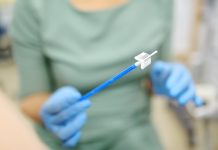Lorraine Clark, Director of hapihemp, explores whether CBD oil can be used to restore hormonal imbalances
From mood swings to insomnia, problem skin and irregular periods, nearly all women have experienced symptoms of hormonal imbalance. Yet general knowledge of the endocrine system is poor, with many only stopping to think about their hormones during pregnancy or the menopause. In fact, hormone imbalance can cause serious health issues, so it’s worth understanding the role they play, problems to look out for and how to address them.
Understanding hormones
Hormones are chemical messengers, sent from endocrine glands to receptor sites in the organs and tissues where they cause changes to take place. Essential for all bodily processes, hormones may be small, but they are mighty – so even a slight excess or deficiency of a particular hormone can have a noticeable effect on your overall wellbeing.
Everyone can suffer from hormonal imbalance, but it is women who are most likely to be affected by hormonal fluctuations, with these naturally occurring during puberty, menstruation, pregnancy, breastfeeding and the menopause. Hormone imbalances can also happen outside of these periods, if one of the endocrine glands produces too little, too much, or even stops producing hormones entirely. This can trigger serious health conditions such as diabetes, thyroid disorders, Addison’s disease and PCOS.
The effects of hormone imbalance
Like thousands of other women, I have battled with hormonal imbalances throughout most of my life. This started during puberty with PMT, or premenstrual tension, which is related to changes in hormones before a woman’s period starts. It’s estimated up to 90% of women experience PMT to some degree[i], with symptoms ranging from being mild to completely debilitating. There are up to 150 potential symptoms[ii], with the most common being cramps, bloating, sleep problems and mood changes. I experienced acute symptoms of PMT from my teenage years, but unfortunately, this was only the beginning of my hormonal problems.
After the birth of both of my children, I was diagnosed with post-natal depression, which again, can be linked to hormonal imbalance. During pregnancy, levels of oestrogen and progesterone are the highest they’ll ever be, but during the first 24 hours after childbirth, they quickly drop back down to pre-pregnancy levels. It’s thought that this sudden chance is what causes postpartum depression. Although fairly common, it is a serious mental illness which severely affects your physical health and behaviour. Like many women, I was prescribed anti-depressants to try and combat the symptoms of my depression, which helped, but not with the crippling anxiety I had also developed.
Then, almost a decade later, I was diagnosed with PMDD, or premenstrual dysphoric disorder. This is a very severe form of PMT, which causes distressing emotional and physical symptoms every month. As my symptoms worsened with age, it got to the point where I was losing half of every month to the debilitating effects. I started desperately searching for a cure.
Treatment options
Treatment options vary depending on the conditions you are diagnosed with. These could be hormone or birth control medication, hormone replacement therapy, or medications which specifically target certain symptoms, such as acne, excessive hair growth and high blood sugar. Unfortunately, this is often down to trial and error and it can take women many years to find the right medications to combat the specific set of symptoms they are personally suffering with.
Natural solutions and lifestyle changes are also often recommended by healthcare professionals. Again, these are dependent on which hormones are not being produced in the correct amounts but are often to do with diet, exercise and stress management. Personally, I tried so many medications over the years, but nothing worked for me. At one point, I felt like there was nothing that could ever help my condition improve, which is why I started looking into CBD.
CBD and the endocrine system
All of us have an endocannabinoid system, which plays a role in maintaining balance in the body. It is known to regulate stress, mood, memory, fertility, bone growth, pain and immune function and is closely linked to the endocrine system. The endocannabinoid system can be stimulated by the use of CBD, a cannabinoid produced by the hemp plant. As such, CBD could be used to influence major hormones including insulin, cortisol and melatonin, so is increasingly being cited as a natural treatment option for hormone problems.
The more research I did, I was astounded to learn how many women were claiming CBD had helped them to take back control of their hormones, so I started to try out different products myself. Since I found the right ones, I haven’t looked back.
Choosing the right CBD
For anyone interested in trying CBD for hormonal issues, it’s important to do your own research into the types of products available and to consult your doctor before trying anything new. CBD comes in many forms; oil drops, capsules, edibles and drinks to name a few and most come in varying strengths. Always look for full-spectrum products, which means they contain all the cannabinoids that are found in the cannabis plant in nature, which maximises the effects of the CBD oil. Always follow the instructions and remember that consistency is key; positive results compound over time and taking CBD oil consistently could help to maintain a sustained level of CBD in your system, this in turn potentially promoting an effective endocannabinoid system.
Hormonal imbalances can impact us all and the complex nature of these conditions can be incredibly overwhelming. It’s important to know that effective treatments do exist, even if finding the right one takes a bit of experimentation. Seek medical support, analyse your options and try out different things, but take comfort in knowing that whether it’s HRT, a lifestyle change, or CBD, there will be a treatment option out there that is right for you.
References
[i] https://www.womenshealth.gov/menstrual-cycle/premenstrual-syndrome
[ii] https://www.healthywomen.org/condition/premenstrual-syndrome-pms/overview











